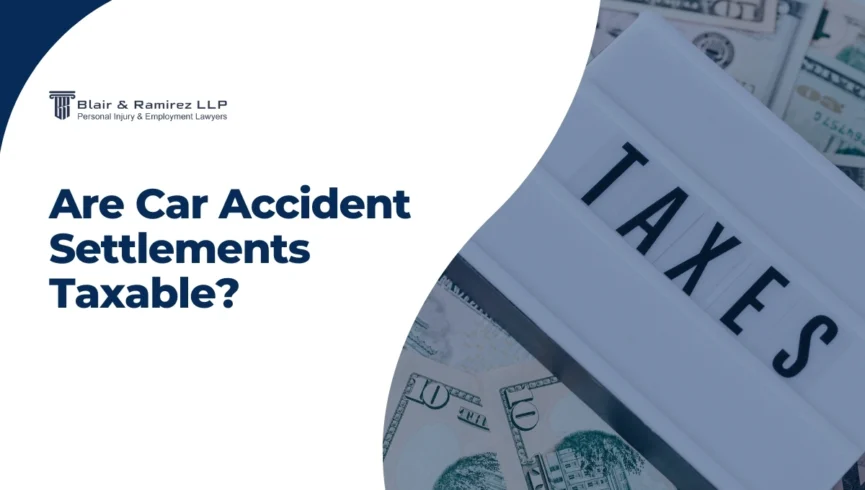Car accident settlements are generally not considered to be taxable when they compensate for physical injuries, medical expenses, or emotional distress caused by the accident. According to IRS rules, personal injury settlements are generally excluded from income, meaning you don’t have to pay taxes on a car accident settlement tied directly to your injuries.
However, some car accident insurance settlements are taxable, particularly damages for lost income or punitive damages. If your auto accident settlement includes lost wages, punitive damages, or interest, the IRS treats those parts as taxable income. While most parts of a car accident insurance settlement will not be taxable, non-physical damages, like emotional distress unrelated to injury, may also trigger tax obligations.
Understanding which parts of a settlement are taxable helps avoid filing errors.
Quick Key Takeaways: Are Car Accident Settlements Taxable?
- Most car accident settlements are not taxable if linked to physical injuries or medical expenses.
- Non-economic damages are not taxable when they stem directly from physical harm.
- Emotional damages unrelated to physical injury are taxable as income.
- Punitive damages, lost income, and interest are always taxable, regardless of injury.
- California tax law mirrors IRS rules, so taxable amounts must be reported on both federal and state returns.
- Structured settlements can help limit tax liability and preserve benefits like SSI or Medicaid.
- Smart legal strategies, such as allocating more of the settlement to non-taxable categories and using precise language in the agreement, can reduce your tax exposure.
- Consult a personal injury attorney to ensure proper settlement structuring and avoid IRS reporting issues.
When Does the IRS Consider a Car Accident Settlement Taxable?
The IRS does not treat all car accident settlements the same way. The taxability depends on the specific nature of the damages, specifically whether the payment compensated you for physical injuries or non-physical injuries.
Below, we'll break down the key IRS rule, the exempt categories, and the ones you’ll need to report.
IRS Code Section 104(a)(2): The Foundation of Tax Exemptions
The backbone of taxation for personal injury settlements is IRS Code Section 104(a)(2). This section excludes from gross income "the amount of any damages (other than punitive damages) received (whether by suit or agreement and whether as lump sums or as periodic payments) on account of personal physical injuries or physical sickness." In simple terms, this means that money received to compensate you for physical injuries or sickness is generally not taxable.
For example, if you receive a payment for a car accident that caused a broken arm and back pain, the compensation for your medical treatments, rehabilitation, and the pain you endured would be tax-exempt.
What Damages Are Always Tax-Free Under IRS Rules?
The IRS excludes certain categories of settlement money from taxable income when they are tied to a physical injury or sickness. These include:
- Compensation for Physical Injuries or Sickness: Money received for bodily harm, disfigurement, or illness caused by an accident is tax-free.
- Medical Expenses: Payments that reimburse past, current, or future medical bills, including hospital stays, doctor visits, prescriptions, and rehabilitation, are excluded from income.
- Pain and Suffering (from physical injury): Compensation for physical pain and the emotional distress from a qualifying injury is not taxed. (If emotional distress is unrelated to a physical injury, it may be taxable.)
- Property Damage (up to original value): Reimbursement for vehicle repairs or other property damage is generally non-taxable, as it restores what you lost. If the payment exceeds the property’s adjusted value, the excess may be taxable as gain.
- Lost Wages (linked to physical injury): Under Rev. Rul. 85-97, when lost wages are part of a settlement for personal physical injury or sickness, they are excluded from gross income. This means the lost income while recovering from an accident-related injury is not taxable.

Which Settlement Categories Are Taxable?
While compensation for physical injuries is generally tax-free, other parts of a settlement are considered income and therefore affect both federal and state tax filings.
The primary categories of a taxable car accident settlement include:
- Lost wages (unrelated to the injury): If your settlement includes compensation for lost past or future wages, back pay, or lost profits in a case not based on a physical injury, such as employment discrimination or defamation, they are taxable.
- Punitive damages: Punitive damages are intended to punish the wrongdoer, not to compensate the injured party. The IRS considers this a financial windfall, so punitive damages are always taxable as "Other Income."
- Interest on settlement: Any interest that accrues on a settlement, both before and after a judgment, is taxable as ordinary income.
When a 1099-MISC Indicates Taxable Income
A 1099-MISC form is the IRS’s way of tracking income it expects you to report. You will usually receive this form if any portion of your settlement represents taxable lost wages, punitive damages, or interest, because these are always taxable.
Not every settlement triggers a 1099. For example, money awarded for medical expenses, pain and suffering tied to a physical injury, or property damage reimbursements do not require reporting and generally will not result in a 1099 being issued.
What Portions of a Car Accident Settlement Are Taxable vs. Non-Taxable?
| Category | What’s Included | Taxable? |
|---|---|---|
| Physical Injury Compensation | Payments for bodily harm, disfigurement, or illness from the accident | ❌ No |
| Medical Expenses | Hospital bills, surgery, prescriptions, rehab, and future medical care | ❌ No |
| Pain & Suffering (linked to injury) | Emotional distress and trauma directly caused by a physical injury | ❌ No |
| Lost Wages (due to physical injury) | Wages missed while recovering from accident-related injury (Rev. Rul. 85-97) | ❌ No |
| Property Damage Reimbursement | Vehicle repairs or replacement of damaged property, up to actual value | ❌ No (unless payout exceeds value) |
| Lost Wages (not tied to injury) | Wage replacement for claims unrelated to physical harm | ✅ Yes |
| Punitive Damages | Awards meant to punish the defendant, not compensate you | ✅ Yes |
| Interest on Settlement | Interest accrued before payout or through structured payments | ✅ Yes |
| Property Damage Gain | Amount paid that exceeds the property’s adjusted value | ✅ Yes (only the excess) |
How Federal and California Settlement Tax Rules Differ
Federal and California tax rules for car accident settlements are largely the same: settlements for bodily injuries, physical sickness, and property damage are generally tax-exempt, while interest and payments that replace ordinary income are usually taxable by both the IRS and the California Franchise Tax Board.
But there are important nuances that claimants must know, especially when both systems overlap.
California’s Treatment of Personal Injury Settlements
The key difference in the state tax rule is in reporting. California has its own state income tax system, which means that if any portion of your settlement is taxable, you must include it on your California Form 540 return in addition to reporting it to the IRS.
Example: If you receive $75,000 for medical bills (non-taxable) and $25,000 in punitive damages (taxable), the $25,000 must be reported on both your federal return and your California state return.
When Both State and Federal Taxes May Apply
Some settlements trigger liability under both IRS and California rules. Dual tax liability typically applies when a case includes a mix of taxable and non-taxable categories.
Example: You receive a settlement of $200,000 that includes:
- $150,000 for physical injury (non-taxable federally and in California)
- $30,000 for lost wages not tied to injury (taxable federally and in California)
- $20,000 in punitive damages (taxable federally and in California)
In this case, both state and federal governments treat $50,000 of the award as taxable income. Failing to account for the overlap can lead to double tax surprises at filing time.
This is why it’s better to consult an experienced car accident attorney or a tax professional in CA. The overlap between state and federal tax rules can create reporting challenges, and professional guidance ensures you don’t underreport or overpay.
How Different Types of Settlements Affect Tax Liability
The structure and nature of your car accident claim can significantly impact your tax liability. Some settlements are issued all at once, while others are paid over time. Certain cases, like wrongful death or insurance-only payouts, carry unique tax questions.
Let's understand how these structures affect your claim and taxability.
Lump Sum vs. Structured Settlements
A lump sum settlement means you receive all compensation in one payment, while a structured settlement spreads payments out over months or years. The table below shows how each payment structure impacts your finances and taxes:
| Type | Pros | Cons | Tax Impact |
|---|---|---|---|
| Lump Sum Settlement |
|
|
Concentrates taxable income into one tax year |
| Structured Settlement |
|
|
Interest built into payments is always taxable |
Tax Treatment of Wrongful Death Settlements
Wrongful death settlements are treated differently depending on the state. Under federal IRS rules and California law, compensation for economic and non-economic losses in wrongful death cases (such as funeral expenses, loss of support, and companionship) is not taxable.
However, if punitive damages are awarded as part of a wrongful death case, those amounts are taxable at both the federal and state levels.
The narrow exception (where punitive damages are treated as non-taxable if they are the only remedy available) applies in Alabama, but not in California.
Are Insurance Claim Payouts Ever Taxed?
Most insurance payouts after a car accident are not taxed because they are considered reimbursement for losses. For example, liability insurance covering your medical bills or auto repairs does not count as income.
But there are situations where taxes may apply:
- If the payout includes interest (e.g., because the insurer delayed payment), that interest is taxable.
- If the payout exceeds your actual loss (such as payment of more than the value of your totaled car), the excess may be taxed as income or gain.
- If the claim involves lost wages unrelated to physical injury, that portion can be taxable.

How Legal Strategy Can Reduce Tax on Your Settlement
While the federal and state law dictates the car accident claim taxability, a strategic legal approach can significantly reduce the amount of tax you owe. It all depends on the way you negotiate and document your settlement.
You can ensure that you keep more of your hard-won compensation by focusing on smart tax planning, such as:
Allocating Settlement Components in Favorable Ways
Settlements often combine multiple categories: medical bills, pain and suffering, lost wages, punitive damages, and interest.
By clearly allocating the largest portion to non-taxable categories (such as physical injury or medical expenses), you may reduce the overall taxable share.
Example: If a $200,000 settlement is left vague, the IRS could scrutinize it. But if $150,000 is allocated to medical bills and only $50,000 to lost wages, only the $50,000 would be taxable.
Choosing Periodic Payments Over Time
You pay taxes on your taxable settlement categories in the year you receive them. A significant lump sum could push you into a higher tax bracket, causing a larger portion of your settlement to go to the IRS.
However, there are strategies to potentially mitigate this tax burden. By spreading out your settlement's payments over multiple tax years, you can reduce your overall tax burden. This approach allows you to control the timing and amount of income received, potentially keeping you in a lower tax bracket.
Strategic Use of Language in Settlement Agreements
The wording in your settlement agreement matters seriously in car accident claims. Vague or careless language can be a loophole for the IRS to question your tax liability.
For example, instead of stating “general damages,” the agreement should specify “medical expenses and pain tied to physical injury” to explicitly distinguish compensatory damages and taxable income. Your lawyer will review the contract and make sure there are no errors.
Lawyer Role in Minimizing Taxable Allocation
Experienced personal injury attorneys analyze your case and negotiate settlement terms to emphasize tax-advantaged categories while staying compliant with IRS and California Franchise Tax Board rules.
For example, a skilled car accident lawyer fights back with evidence if the opposing side tries to categorize a large share as lost wages (taxable) rather than medical bills (non-taxable).
This proactive role often saves thousands of dollars during tax season.
Common Myths About Car Accident Settlement Taxes
Misunderstandings about settlement taxation are common, especially in motor vehicle crash claims. Here are 4 such myths clarified under IRS and California rules.
| Myth | Reality |
|---|---|
| Every type of personal injury settlement is tax-free. | Only compensation for physical injuries and medical costs is tax-free. Punitive damages, interest, and certain lost wages are taxable. |
| Emotional distress awards are always non-taxable. | Emotional distress tied to a physical injury is non-taxable. If it’s standalone (without injury), it is taxable income. |
| You can ignore tax issues if no 1099 is received. | A missing 1099 form doesn’t erase your responsibility. By law, you must report all taxable income, even without a tax form. The responsibility rests with you, not the payer. |
| Attorney fees are always deductible. | Only fees tied to taxable portions (punitive damages, lost wages) may qualify. Fees related to non-taxable injury compensation cannot be deducted. |
Best Practices for Managing Car Accident Settlement Money
Receiving a car accident settlement can provide much-needed financial relief, but managing the funds wisely matters for long-term financial security. Without a clear plan, the money can be misused or lost to unexpected tax liabilities.
The best practice for managing your recovery money is to have a short-term plan to cover immediate obligations and a long-term strategy to preserve your funds from misuse and tax surprises.
How to Protect Your Settlement Funds From Misuse or Tax Exposure
- Keep settlement money separate and deposit funds into a dedicated account rather than mixing with everyday income.
- Track categories carefully by maintaining records showing which funds are for medical bills, property damage, or pain and suffering. This protects the non-taxable portions if the IRS ever reviews your return.
- Avoid quick spending and budget your payments, or work with a financial planner to extend the benefit of your recovery.
- Consider structured payouts for long-term needs. It can reduce tax exposure and ensurea steady income.
- Consult an accident injury claim attorney early or get help from a tax advisor.
Will a Settlement Impact SSI, Medicaid, or Other Public Benefits?
Yes, a personal injury settlement can negatively impact your Supplemental Security Income (SSI) and Medicaid benefits because these programs have strict income and asset limits, and a settlement can push you over these thresholds.
Solutions:
- Use a Special Needs Trust (SNT) or similar planning tool to protect eligibility.
- Report the settlement correctly to avoid penalties.
- Work with a car accident attorney who understands both personal injury law and public benefit rules.
FAQs About Settling Car Accident Claims Without a Lawyer
What’s the Best Way to Keep More of Your Car Accident Settlement?
The best way to keep more of your settlement is through strategic tax planning at the negotiation stage. Clear allocation of damages, precise wording in your agreement, and thoughtful payout strategies can all reduce unnecessary tax exposure and preserve the maximum of your recovery.
For most accident victims, these legal steps are not easy to handle alone. The IRS and California Franchise Tax Board apply strict rules, and mistakes can be costly. By working with an auto accident attorney who understands both personal injury law and the tax implications of settlements, you protect your financial recovery as well as your legal rights.

Tell Us What Happened - We’re Ready to Help


